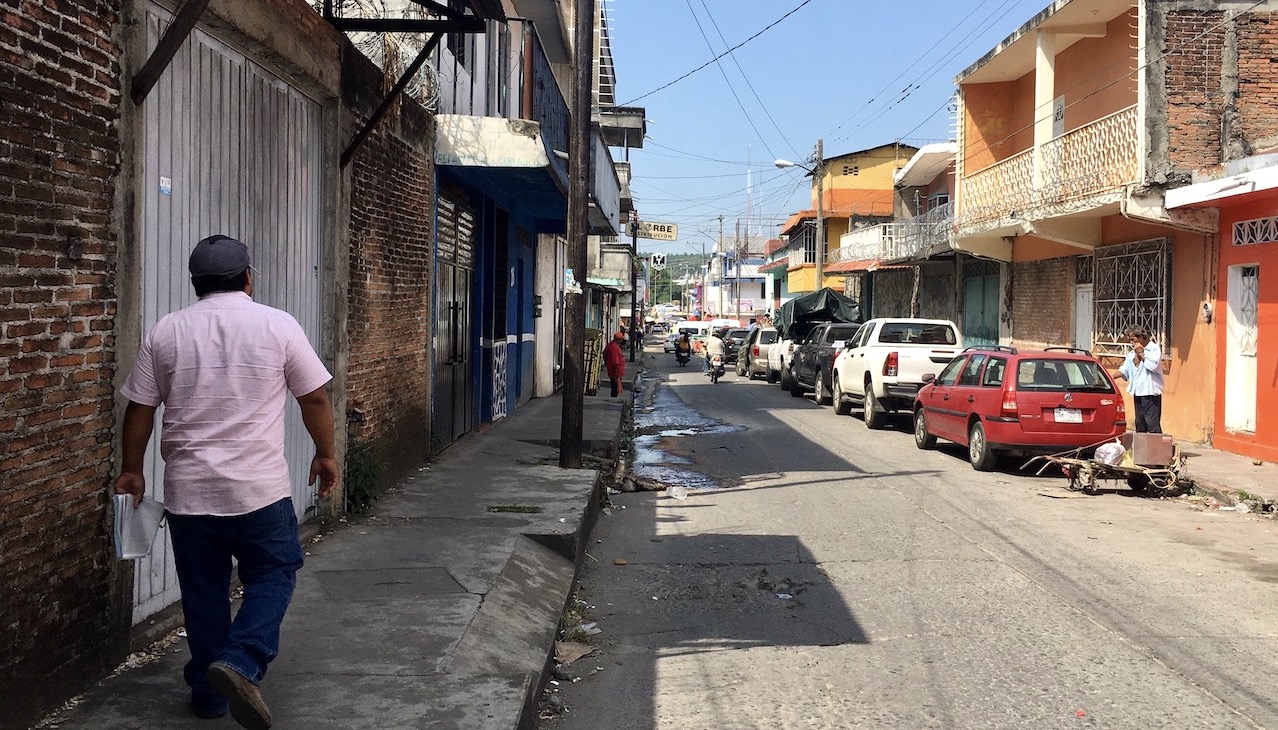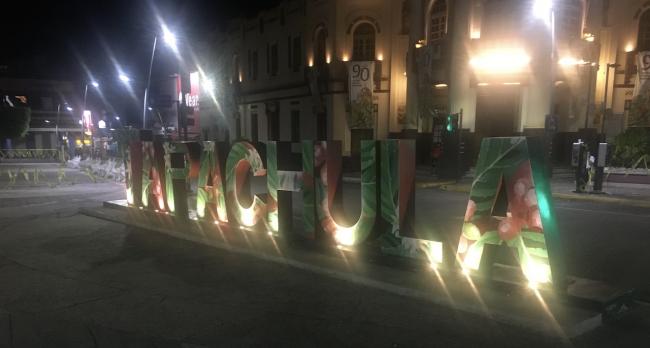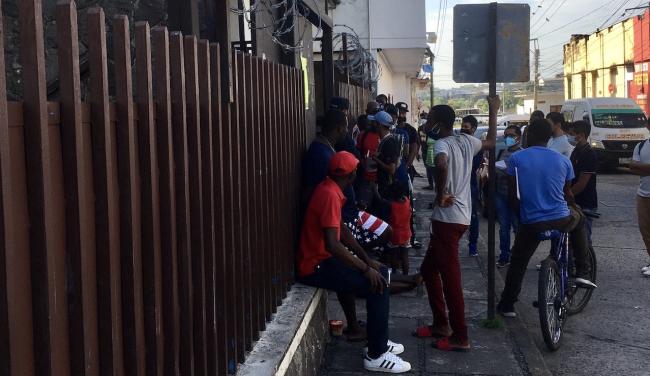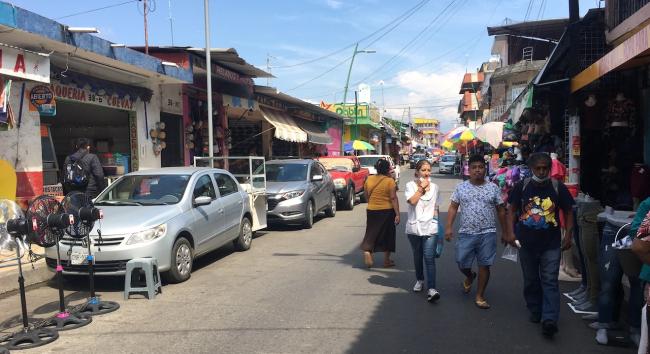Statistics on migration in Mexico show that, compared to migrants from Central America, Cubans are a fortunate group. This fact is extremely curious, given that the continued presence of the islanders on the dangerous roads that lead to Tapachula is relatively recent, and coincided with an era marked by anti-immigrant policies emerging from Washington, with repercussions throughout the region.
Cubans' relative advantages are evident in the daily life of Tapachula, and in the statistics. However, there is data also showing that the benefits of being a Cuban immigrant can also turn into deadly stigmas. In a region marred by violence and organized crime, even privileges can turn into perils.
Advantages
Besides the music they listen to and their distinct accent, which can be heard from a mile away, it is also quite easy to recognize Cubans by their economic status. Their clothing, state of health and the jobs they most commonly take make Cubans perhaps the migratory group that is most welcomed and best adapts to the social dynamics of Tapachula.
This is mainly due to the fact that, above all, most Cubans do not arrive in Tapachula with empty pockets. Part of the capital with which they arrive, according to several interviewees, comes from the sale of properties in Cuba, such as cars and houses. The other portion usually comes from the money they save in the urban areas they pass through on their way to Mexico.
While Salvadorans, Guatemalans, Hondurans and Nicaraguans make gruelling, ceaseless journeys, on which they usually continue without stopping for "caravans", Cubans usually stop to look for work, make money, and continue their treks. Cubans, in general, cannot conceive of migrating without the security of money.
This last point prompts many Cubans to forego travelling in caravans. In most cases, when hundreds of Cubans make up a caravan it is for two main reasons: they do not have enough resources to continue on their own, or in small groups; or some border bottleneck causes them to coincide with hundreds of other migrants.
According to Rita Robles, Head of Advocacy at the Fray Matías de Córdova Human Rights Center, "Cubans and Africans, unlike Central Americans, bring many resources with them."
"As they have money, Cubans do not usually sleep on the streets, or seek help from human rights organizations, but rather rent rooms in houses, or sleep in hotels," she continued.
According to Robles, another distinctive feature of Cubans compared to the rest of the migrants in Tapachula is their level of political awareness.
"Central Americans accept everything. They are not aware that they have rights. They ask for everything as it were a favor. Cubans, on other hand, do not plead, and do not back down. Cubans show up, demand their rights, and start giving orders," she explained.
Cubans have often been involved in protests and clashes occurring along the Mexican border. In general the presence of Cubans at a border crossing closed to a caravan means that the mass of migrants will end up organizing and asserting its right to continue along its way.
"During the periods in which the caravans have been stuck, the Cubans have harangued the authorities, who are not used to dealing with such people. Cubans do not knuckle under, and since this is not normal, they manage to be heard in the end," Rita Robles told DIARIO DE CUBA.
Cubans' habit of voicing demands can backfire on them, however. In April 2019, several Mexican media sources reported the arrest of a Cuban doctor who organized a whole caravan of migrants to cross Tapachula. Mikel Hernández, a specialist in Neurology, not only organized the group, but also became a spokesperson for it, vociferously condemning the continuous human rights violations to which those stranded in the city were subjected.
"One day he disappeared, and we inquired as to his whereabouts. We filed a forced disappearance complaint, but then it came to light that the Federal Police had arrested him. They took him to the Siglo XXI immigration facility, and later deported him to Cuba. "
Another of the most prominent advantages that Cubans have over other migrants in Tapachula is the possibility of finding employment. While most Central Americans (many of them illiterate) live on the charity of religious and human rights institutions, shine shoes, or work as greeters at small stores for tiny tips, Cubans can access other types of jobs due to their levels of schooling.
"I worked in garbage collection until last week. Many Cubans do. It's like the easiest job to get. And it's not bad, because it's 2,500 pesos ($125) for two weeks of work," said Yadiel, who had already left this job to make his way up to the northern border with his wife.
"Working as a barber is not bad, but you depend a lot on the tips. I work at a Venezuelan barbershop, perhaps the only one with air conditioning in the whole city. The salary is about 2,500 and 3,000 pesos (150 dollars). You finish the month, if you are lucky, and customers leave you something, but important people go there and you always get by," Javier told us.
The DDC was able to confirm that the most common jobs Cubans take in Tapachula are, precisely, as barbers/hairdressers, and garbage collectors. The latter, although it may be hard to believe, offers good pay for migrants in this southern part of Mexico - sometimes better than a barber position. To understand how far this much money can go for a Cuban, it suffices to know that most of the small rooms they usually rent in Tapachula cost about 1,400 pesos (70 dollars) per month.
"In addition to the funds they possess and their professional skills, another of the things that ensures employment for Cubans is the fact that the vast majority of those who cross the border and pass through Tapachula are young men. This does not mean that there are no women, but they are few relative to men, and almost all of them are very young," Robles reported.
Curses
The fact that the Cuban migrant generally enjoys certain advantages relative to his Central American counterparts, however, does not mean that he does not face the same dangers. In fact, according to Robles, some of these attributes can actually be a cause of mortal danger along the route to the United States.
The fact that they travel with money makes them prime prey for highway thieves, who are aware of this difference between Cubans and the Central Americans and Haitians who cross the jungle.
Another major hazard they face is kidnappers. In mid-2019, to cite one example, five Cubans were kidnapped in Ciudad Juárez by organized crime members. After they were released the news spread, and other Cubans stepped forward to report threats, kidnapping attempts and efforts to force them to join prostitution networks. Generally, this does not happen in Tapachula, which, according to the latest Peace Index, lies in the third safest state in the country, by Mexican standards.
"Cubans are plagued by some very dangerous sexual stereotypes, especially in the north of the country, where they can be victims of human trafficking networks. This mainly affects Cuban women, who are easy targets for these groups, which prefer them," said Robles.
"Moreover, Cubans' insubordinate attitudes towards immigration authorities can work against them. And, when it comes to organized crime, they can be downright deadly."
According to Robles, organizations working with the Fray Matías de Córdova organization and others dedicated to the protection of migrants' human rights do not have solid statistics on Cubans in Mexico. These groups, along with other religious institutions, have a network of shelters throughout the country that take in migrants, and that also track them, acting in the event of enforced disappearances. Because Cubans travel with money and stay in hotels, or rent rooms in houses, it is almost impossible to record statistics on them.
And, although most Cuban migrants are young men, several children arrive every year in Tapachula after having crossed Central America. In the last two years, according to statistics, the INM (immigration institute) in the state of Chiapas registered the arrival of 188 minors from the island, 21 not accompanied by an adult. Of the latter, 13 were under 11 years of age. The stories behind those boys and girls who came to Mexico will never appear in the statistics. Sadly, neither will there be any record of those who did not make it.



